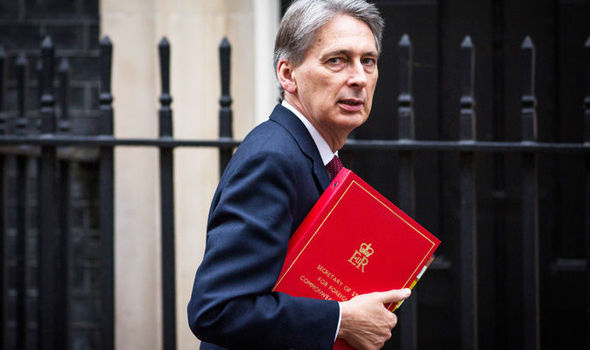The Chancellor gave some scraps for the North of England in his budget statement delivered today.
Greater Manchester will get a share of £1.7b Transforming Cities fund of which half will be shared between the six metro mayors,while half will be for other cities.
Manchester will also see a regional tech hub set up as part of a £21m digital investment
On transport, Philip Hammond announced £300m to future-proof HS2 for HS3 and £30m for mobile connectivity on the Trans Pennine rail route.
On housing, the government announced that it will abolish stamp duty for all first-time buyers for homes worth up to £300,000 in the UK, while the government promised to provide a £44bn capital investment to boost the housing market.
Hammond forecast that by the mid-2020s there should be 300,000 homes being built every year, the highest level since the 1970s while there are also plans to allow councils to charge a 100 per cent premium on council tax on empty properties.
The budget also includes measures to tackle homelessness, with Manchester chosen as one of three pilots for a £28m Housing First scheme.This will provide rough sleepers with accommodation and support to help them with issues such as mental health problems and addiction.
The Living Wage is to rise by 4.4pc to £7.83 an hour from next April – up from £7.50 now while the basic-rate income tax threshold will rise to £11,850 in April next year, up from £11,501 today, while the higher rate threshold will rise to £46,350, up from £45,001 today.
There will be a new railcard for people between the ages of 26-30.
There will increase tax on low-quality alcoholic drinks but duties on other alcoholic drinks will be frozen, the duty of petrol will remain frozen but from next April,diesel cars that don’t meet air quality standards will be hit by additional tax.
The chancellor announced incentives for those using electric vehicles,including a new £400m charging infrastructure fund.
For the NHS, there will be £10bn capital investment to the NHS over this parliament, this year there will be an extra £2.8bn to NHS England. There will £350m given ( immediately and the balance fully paid by 2020.
On the controversial Universal Credit, Mr Hammond said he had earmarked a £1.5bn package to cut to waiting period for payments and make it easier for claimants to receive an advance.
He said he would remove the seven-day waiting period so entitlement for universal credit starts on the day of the claim, adding that any household needing an advance can access a full month’s payment within five days of applying.
Mr Hammond said the repayment period for these advances will also be extended from six to 12 months.
The Office for Budget Responsibility has cut the UK’s growth forecasts sharply, saying growth will drop to 1.3 per cent by 2020 and then rise to 1.5 per cent in 2021 – the weakest forecast for UK economic growth since at least 1983 while Hammond announced a £3bn Brexit contingency planning fund.
Commenting on the Chancellor of the Exchequer’s Autumn Budget statement, Christian Spence, Head of Research and Policy at Greater Manchester Chamber of Commerce, said:
“The Chancellor had a difficult job in balancing competing expectations of both fiscal prudence and economic reform, with these having to be delivered against markedly lower growth forecasts for the UK economy, weak productivity and the challenges both abroad of Brexit and at home with housing, benefit reform and stagnant wages. There are a number of positive measures brought forward, particularly around housing and stamp duty, universal credit and investment. However, perhaps the key point from this budget is that the long-term growth rate of the UK economy looks now to be only around 1.5% with continued weak productivity, and it is through this lens that all other policies should be viewed: do not understand the challenges that this will bring.
“Greater Manchester was mentioned numerous times, with confirmation of £243m from a Transforming Cities Fund for local transport, support to develop a local industrial strategy and on land value capture, as well as investment for homelessness initiatives. Measures around support for the housing market are welcome, but the review into land banking must be handled with caution as this could be riddled with unexpected consequences. Further investment for construction skills is vital, and we welcome other initiatives to support schools and colleges advance learning for their students, particularly in mathematics. These measures, alongside a greater focus on R&D and investment are positive ways that the UK economy can attempt to close its productivity gap with its competitor economies.
“But for businesses, the biggest positive message is in business rates reform, for which we have long argued. The indexation to CPI instead of RPI will save Greater Manchester businesses around £10m per year, though we must now also consider the effects that this may have on our local authorities at a time of 100% retention of revenues. Revaluations moving to every three years instead of five will help to smooth the gaps, but it must be matched with a reduction of administrative burden and a simplification of the system overall. We maintain our call that business rates in the UK remain unfit for a 21st century economy in its current form, and will maintain pressure on government to commit to a wholesale review of the system.
“Overall, the Chancellor has managed to deliver a better Budget than many commentators were expecting. The challenges facing the UK overall and its businesses are large; this Budget will have helped for some of those, but there remains much to be done to prepare the UK for its future outside of the EU.”







